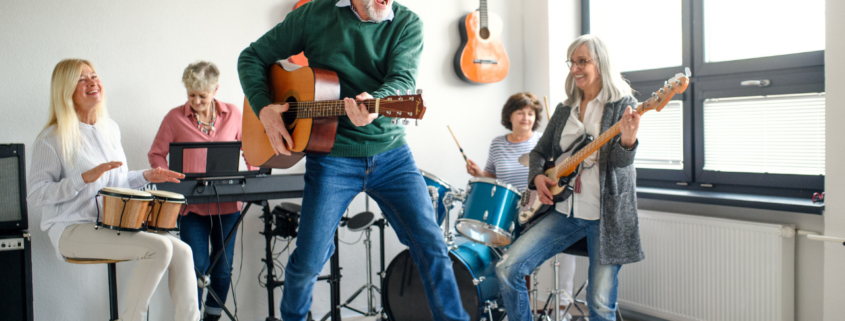Music and Wellbeing
Music is powerful medicine
Music holds the power to increase dopamine levels (happy hormones), decrease symptoms of depression and pain and can improve quality of life.
Music is one of the few activities that uses both sides of the brain (logical and creative). It helps build important brain connections, and the more connections we have, the faster we are able to think.
Music can help blood flow, reduce the heart rate, lower blood pressure, and decrease the stress hormone cortisol levels while increasing serotonin and endorphin levels in the blood.
Music elevates mood. With the right song, it can boost the brain’s production of the hormone dopamine. This increased dopamine production helps relieve feelings of anxiety and depression.
Music can manage and ease pain. It can reduce the perceived intensity of pain, especially in geriatric care, intensive care or palliative medicine. Music therapy can assist in pain management by reducing stress levels and providing a strong competing stimulus to the pain signals that enter the brain.
Music stimulates memory. For Alzheimer’s disease, dementia or Parkinson’s disease—music has the power to revive lost memories and slow age-related cognitive decline. Music therapy can relax an agitated patient, improve the mood and open communication in patients.
Don’t believe us? In the words of a professional:
I believe that engagement in musical arts provides both proactive brain growth and preventative health care. This means that music activity promotes optimal intellectual and creative growth and productivity—major assets to our changing society—and helps reduce the risk or progression of numerous medical conditions that carry an enormous economic burden—Parkinson’s disease, Alzheimer’s, and the effects of premature birth, to name three.
In just the past several decades, the field of music neuroscience has become a central and valued part of hard scientific study in our society. We now “get” that music is one of the major frontiers of science and medicine—we have plentiful evidence, and dedicated pioneers on the path to discovering WHY we need to keep music in our lives, in our schools, and in our centers for healing.
Dr. Jessica Phillips-Silver, PhD, is a cognitive neuroscientist at Georgetown University with an expertise in music and childhood development.
Sources
Aging and Music – 9 Health Benefits of Music. https://www.northshore.org/healthy-you/9-health-benefits-of-music/
Aging and Music – How Listening to Music Can Have Psychological Benefits. https://www.verywellmind.com/surprising-psychological-benefits-of-music-4126866
6 Ways Music Can Lift Your Mood. https://www.psychologytoday.com/ca/blog/science-choice/202112/6-ways-music-can-lift-your-
mood#:~:text=Key%20points,places%20that%20they%20remember%20fondly.
Music Can Be a Great Mood Booster. https://www.aarp.org/health/brain-health/info-2020/music-mental-
health.html#:~:text=Research%20shows%20that%20music%20can,of%20the%20stress%20hormone%20
cortisol.
The many benefits of music.
https://earlychildhood.qld.gov.au/early-years/activities-and-resources/resources-
parents/encourage/the-many-benefits-of-music.
Creativity and improvisation as therapeutic tools within music therapy. https://pubmed.ncbi.nlm.nih.gov/23944968/
Music on Our Minds: The Rich Potential of Music to Promote Brain
Health and Mental Well-Being. https://www.aarp.org/content/dam/aarp/health/brain_health/2020/06/gcbh-music-report-
english.doi.10.26419-2Fpia.00103.001.pdf

